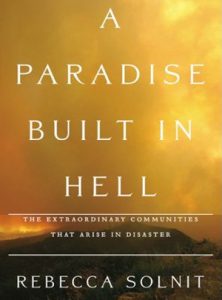disasters
Dorothy & Rebecca
March 9, 2020Dorothy Day [1997-1980], journalist and social activist, was 8 years old on the night of April 18th, 1906, living in Oakland, during the San Francisco earthquake.
‘There were broken dishes all over the floor, along with books, chandeliers, and pieces of the ceiling and chimney. The city was in ruins, too, temporarily reduced to poverty and need. But in the days after, Bay Area residents pulled together. “While the crisis lasted, people loved each other,” she wrote in her memoir decades later. “It was as though they were united in [compassionate] solidarity. It makes one think of how people could, if they would, care for each other in times of stress, unjudgingly in pity and love” [David Brooks, The Road to Character, 2015, pp. 74-75.].’
‘Writer and editor Paul Elie has said, “A whole life is prefigured in that episode”…the crisis, the tense of God’s nearness, the awareness of poverty, the feeling of loneliness and abandonment, but also the sense that that loneliness can be filled by love and community, especially through solidarity with those in the deepest need [Brooks, p. 75].’
The most startling thing about disasters, according to award-winning author Rebecca Solnit, is not merely that so many people rise to the occasion, but that they do so with joy. That joy reveals an ordinarily unmet yearning for community, purposefulness, and meaningful work that disaster often provides.
A Paradise Built in Hell is an investigation of the moments of altruism, resourcefulness, and generosity that arise amid disaster’s grief and disruption and considers their implications for everyday life. It points to a new vision of what society could become-one that is less authoritarian and fearful, more collaborative and local.
NYTimes:
“What is this feeling that crops up during so many disasters?” Ms. Solnit asks. She describes it as “an emotion graver than happiness but deeply positive,” worth studying because it provides “an extraordinary window into social desire and possibility.” Our response to disaster gives us nothing less than “a glimpse of who else we ourselves may be and what else our society could become.” Her overarching thesis can probably be boiled down to this sentence: “The recovery of this purpose and closeness without crisis or pressure” without disaster, that is “is the great contemporary task of being human.”
In “A Paradise Built in Hell” Ms. Solnit probes five disasters in depth: the 1906 earthquake and fires in San Francisco, the Halifax munitions cargo ship explosion of 1917, the Mexico City earthquake of 1985, the events of 9/11 and Hurricane Katrina. She also writes about the London blitz, Chernobyl and many other upheavals and examines the growing field of disaster studies [2009].

